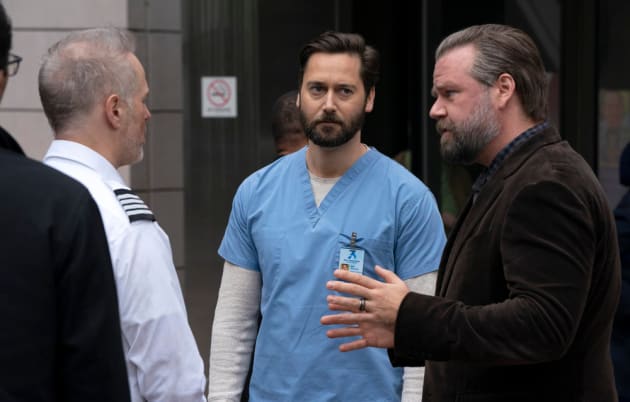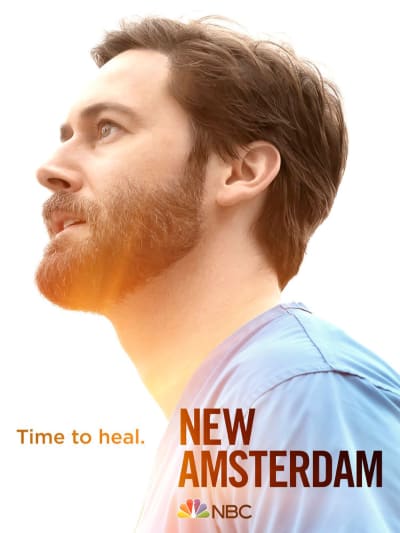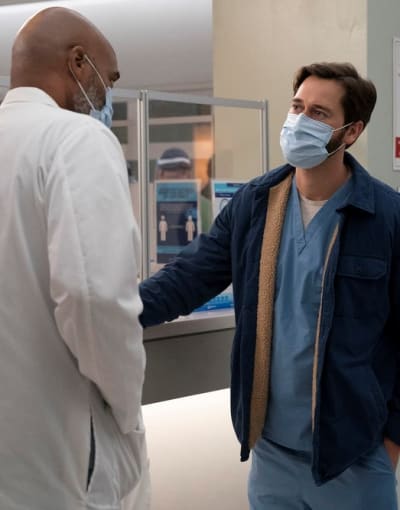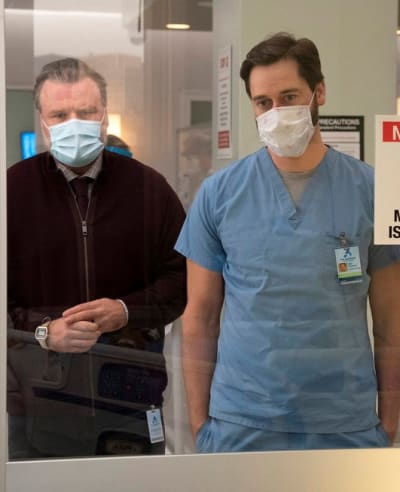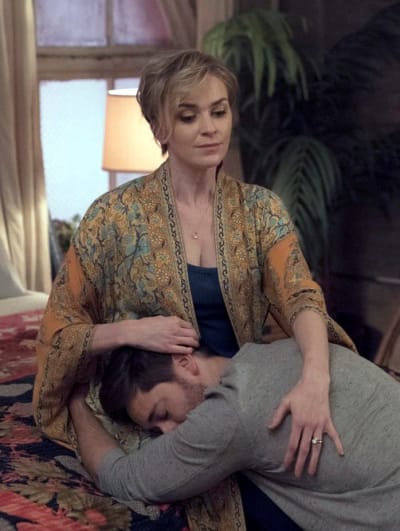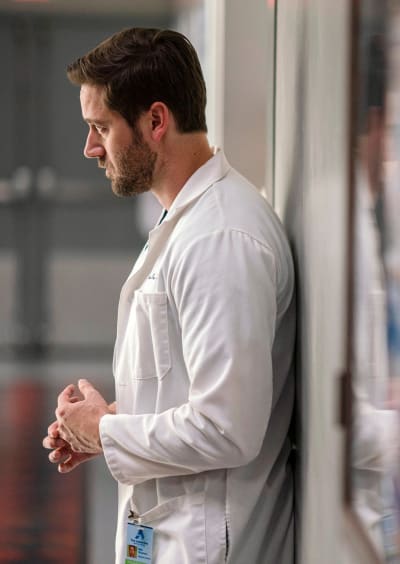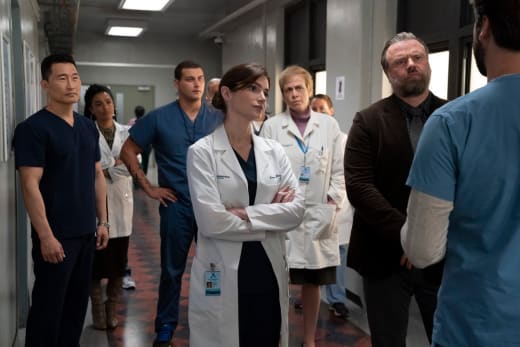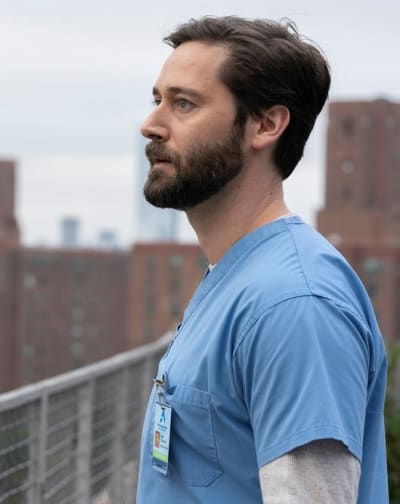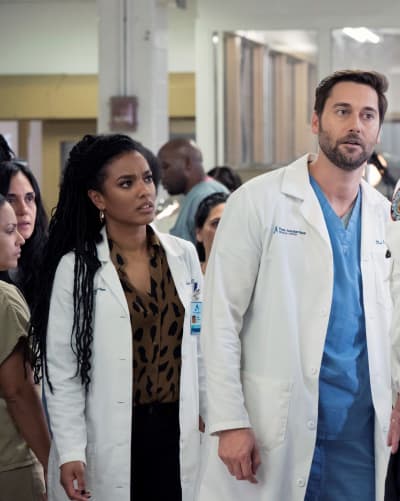New Amsterdam has finally returned to us.
The poignant medical drama is back and has doubled down on making statements and taking stances.
If you didn’t think the series could move you to tears before, then brace yourselves as New Amsterdam Season 3 is coming full-force with an emotional season that perfectly encapsulates human emotion and experience during these mid-pandemic times of social change and turbulence.
The series, in a way, lucked up with the perfect timing for its return, as it aligns with our timeline, and in turn, focuses less so on fighting COVID but rather on the steps toward healing.
TV Fanatic caught up with Executive Producers David Schulner and Peter Horton to discuss tackling COVID, systemic racism, and how our beaten-down hero still clings to optimism and a goal of change.
What was the goal going into this season with choosing to cover the pandemic? Obviously, the show takes place in New York City, which got hit hard at the pandemic’s height.
David: Yeah, we, for us, at the forefront of our mind, was honoring the real-life doctors we’re portraying on the show — honoring the medical advisors who work at Bellevue and knowing that they go from our set back to Bellevue.
[Our goal was] that we had to tell the truth and tell it as honestly as we could. Otherwise, honestly, we couldn’t look at ourselves in the mirror, and we couldn’t look at the wonderful Lisa and Jeff who advise us. We couldn’t look at them and not do this right.
Peter: And then on top of that, what we realize is since we weren’t coming on until March, our hope was, and it seems to pan out, that by the time we came on, we’d be in the process in our country and the world, hopefully, of moving through this, of trying to heal.
Having given the authenticity of what everyone has gone through, we then felt like this season should be about: how do we heal? How do we rediscover our humanity? How do we rediscover this new normal that we’re finding ourselves in?
What is it? What toll has it taken on us, and how has it influenced our relationships with other people, with ourselves, with our outlook on life? Because it definitely has taken a toll on all of us. So how do we as a family on a TV show illustrate and dramatize the process of healing?
It’s such a tricky balance, and all of you have such a tough job, and I, of course, have seen how different shows manage the pandemic coverage. Some of them are just so grim.
How do you capture the right tone? You don’t want to overwhelm fatigued viewers who are seeking some escapism, but you also want to keep it grounded and real while maintaining New Amsterdam’s signature hopeful tone.
David: Luckily, Max is an optimist. And Max dictates the tone of our show. So in New Amsterdam Season 1, when Max was at his worst with his cancer treatments, our series went very dark very quickly.
Yeah, it did.
David: [In] New Amsterdam Season 2, Max was grieving Georgia, his wife, we went head-on into grief and dealing with all the different stages of it. In season three, Max is beaten down physically and emotionally, and yet, hopeful that he can rebuild New Amsterdam from the ground up.
Because finally, the pandemic has laid bare everything he’s been screaming about for two seasons: the inequity of our health system, the economic disadvantage certain patients have over those who have money. The insurance industry. Big Pharma industry.
Finally, everyone sees what Max sees. How badly this system needs to change. So he’s actually invigorated by this chance to remake New Amsterdam from whole cloth this year.
So that optimism is how we launch, and Max is going to get beaten down as bad as he’s ever gotten beaten down this year, but his optimism doesn’t waver.
You were able to keep the same essence of Max –with all of the characters — he’s a bit more jaded but still has that can-do attitude. After seeing the first couple of episodes, Max isn’t out of character, but we see the wear and tear on him just from the pandemic.
What’s the difference between the idealistic Max of the first two seasons and Max now? His idealogy is the same but has his methodology or approach in fixing things changed?
Peter: I think, yeah. As dark as this cloud has been, um, there are silver linings in it. One of them for us as storytellers, especially in this world, is it really creates such big obstacles to Max’s optimism.
Before it was like life as we knew it, it had its obstacles, but in retrospect, it’s nothing like what we’re dealing with now, and so the nature of drama is overcoming obstacles. That’s what makes it so moving to us when we see that play out.
The opportunity for Max and all of his optimism to go up against something that’s so overwhelming and so unbelievable for all of us to go through creates this fabulous arena for us to play out that journey. And his constant charging of these monsters that we’ve lived with for the past year.
David: And we’re not even talking about just COVID.
Peter: Right.
David: I mean, the social issues that came to the floor this last year are health issues. Racism is a health issue. Economic disparity is a health issue, and Max has to confront all these social issues this year, as well, because they’re impacting our nation’s health.
Peter: The stakes have gotten so high now. We really do live in a time of stakes, and for a show like ours, that’s dealing with real social issues – that was the subversive motive for us behind doing this show.
Because it’s a hospital show, we get to deal with every social issue the country faces. Those issues are so magnified now. And so the good news is we get to deal with them. The bad news is they really are acute and threatening in our culture.
Your show is one of the best shows equipped to incorporate things like this (COVID, social issues) in such an organic way because you already explore similar things anyway.
How much did COVID and all of this throw off your writing, storytelling, and plot points this season? Did you get to cover everything you planned? Did incorporating COVID naturally flow from your initial plans? I mean, all of this threw everyone a curveball.
David: Once COVID hit, we knew it would be the story of the season, and how can it not be?
Then, two weeks before we started in the writer’s room, George Floyd was murdered, and so the curveball of the pandemic was only the first curveball because we knew that when George Floyd was murdered, our country erupted.
Systemic racism in healthcare, in business, in our education, and basically every institution in America was being called out. We knew we had to be a part of that too. We just kept getting these curveballs, and with each one, we knew we had to shift and incorporate it.
The whole reason I wanted to do New Amsterdam, back a thousand years ago, was our healthcare –the ACA– was under threat. And so this is my rallying cry, my anger, my frustration of ‘why are we taking away people’s healthcare?’
And it never went away, unfortunately.
Um, and this year, it’s not only my rallying cry — but it’s Peter’s, and the writers, and the crew, and the actors, and everyone’s passion, and anger, and sadness, and frustration, and loss that we’re feeling right now.
The third season of New Amsterdam premieres tonight at 10/9c on NBC. Check back in for our full review and more with Schulner and Horton in our post-mortem interview.
If you need a refresher beforehand, you can watch New Amsterdam online here via TV Fanatic.
Jasmine Blu is a senior staff writer for TV Fanatic. Follow her on Twitter.
